THE PASSING AWAY OF BERNARD SANTA MARIA
Bernard Santa Maria who died in his native land Malacca, was a politician, a writer and "leader" of the christian community of luso-descent in Malacca.
Bernard Santa Maria was educated at the Instituto S. Francisco and at Escola Secundária de Malacca.
He was secretary to the Democratic Action Party of the State of Malacca having presided at the National Bureau of Labour as well as a member of the Central Executive Council. While representing his Party, he participated in the Asia/Pacific Socialist Conference in 1972.
Elected deputy, at the first attempt, to the Legislative Assembly of the State of Malacca in 1969, he was then re-elected in all subsequent elections, taking part in various special Commissions of the same Assembly.
In 1981, he represented the State of Malacca in the Parliamentary Conference of the British Community that took place at Suva, in Fiji islands.
He founded the Portuguese Cultural Society in 1967 and was the head of the Malacca Portuguese Development Trust.
He was a very keen researcher with respect to Portuguese culture in that part of the world, where he visited Portuguese communities in Australia and Hawaii in 1981, and in 1984, he accompanied the Prime-Minister of the State of Malacca on his visit to Portugal when an agreement on the twin cities of Malacca and Lisbon was signed.
He was in Macau, in June of 1986, and on the occasion of the Commemoration of the Day of Portugal he gave a notable speech under the title of "O Alcance e as Dimensões da Consciência Portuguesa no Extremo Oriente", (The Attainment and the Magnitude of the Portuguese Conscience in the Far East) which was published by R. C. in its maiden issue, under the title - "Portugal in the East, now and hereafter".
Among his publications there is an outstanding one, titled "My People, My Country", narrating emotionally the displeasures the Portugueses and their descendants had to undergo while remaining in Malacca from the time of Dutch occupation in 1641 till present times, a work which is being prepared to be published in Portuguese by the editorial sector of ICM.
Portuguese Malacca has two historical periods: a period of political and military rule initiated by Afonso de Albuquerque between 1511 and 1641 and a period of cultural resistance which continued since then and outlasted till now.
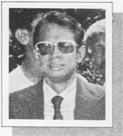
Persecuted and deported by Dutch protestant authorities for being catholics and disqualified socially during the course of centuries from mingling with the ethnic population of the Malaya Federation, the Portuguese were considered a social burden, and could not even afford to join universities, consequently rose to be integrated in the social structure of the country-the marvellous luso-descents of Malacca preserved not only of what remained of their 300 years of cultural identity but also of other communities which had spread through Malaysia, Singapore and Indonesia.
The stage has been left void with the demise of Bernard Santa Maria the untirring and most outstanding fighter of christian community of luso-descent of present time Malacca•
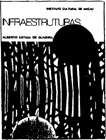
ON "INFRASTRUCTURES" BY ALBERTO ESTIMA DE OLIVEIRA
With the publication by ICM of his book of poems "Infrastructure", Alberto Estima de Oliveira has revealed in Macau his authorship of a poetry which is dry, judging almost abstract, where the depuration and strict adherence to forms bestows yet a greater density and intensity on a caved society - a society essentially explored by a radical mankind. As also with Estima de Oliveira and later on with the productive creativity of António Manuel Couto Viana, both the stimulus as well as the encouragement to other poets and their publications-it can be said that Macau is on the threshold of producing its own poets. And better late than never, Macau badly needs the Poetry in this historical period of transition.
In this book a graphic presentation by António Conceição Júnior imposes a comprehensive emphasis on the poetic form. We are publishing below an appreciative commentary by Jorge Arrimar:
In the poetry by Alberto Estima de Oliveira we find a way of escape in a circumstancial chart of reference in a setting of universal design. Emerging from historical, social, ideological or real politics, the poet elaborates on a scheme of judgements which, inspite of inseparable historical activities in which they have been implanted, does not diminish, before long in one's own nature and functional experience.
Hence the poet takes wings and seizes control of the meaning of things thereon, investigating with spiritual freshness the sign of each experience and the proportion of each individual.
The setting of Alberto's poem is found to be immortalized at the horizon where everything is either a gain or a loss. It is a cosmic, universal setting initiated on land and having its origin in heaven. Yes, it is sound in principle, from the prime ruby-red splendour of acacia, which is the root of his song. To its own character, Alberto attached another character, strongly noisy, "in the forest where the foliages are discovered in the eyes of the people who know how to dream"... Therefore his poem is simple where a full life is projected and marked by a chronological period of gracefulness and oppression. And therefore in this sense while taking his leave, he never says "until tomorrow"; he always says "see you later". It is an escape of what happened during that day and the night after. There is the necessity to meet for the second time eternally on the same day. The anxiety is constant in a being that searches desperately his vital place, where the sources still bleed from a savage cut; it is the hopeless search of the self in a still greater vaccum" pregnant with the dawn of silence".
Alberto's poetry is made of quest and question. It is an expression of magic and goodness in exorcising the spirits obstructing the communion with the living and with the reality of delight. The expression is the rythm which carries the initiator to gratify in the enchantment, in the dream, and in the escape. It is through that power that the poet tries to re-unify the very often humiliated, diffused meanings. The result of those joint psychological, historical and sociological relations which raised his visionary world is not only from his innermost angolan reality with its myths and symbols - with deliberately assumed option - but also, his capacity to philosophically and esthetically yield to an open system. It is the poet's liberty that, according to him, is localized in "the space where it does not register the flight of the sea-gull... where everything ends and begins" and where "love is the discovery of the infinite"•
THE CERAMICS AND THE SKILL OR THE SKILL IN THE CERAMICS
Macau had the privilege to witness last June a relatively unexpected exhibition, considering the old tradition - of manufacture, or even the topic - of Chinese ceramics.
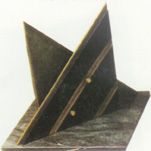
The title, suggestive in convincing the spectator in a game of words not committed by redundancy, before limiting to formulation of judgements, necessarily arbitrary and thus resulting in the formal innovation that this exhibition has brought the traditions here in force.
I had the opportunity to talk with Maria João Oliveira discussing with her more intimately her intentions directed to the creative process. However, if this excursion to an unknown world constituted for me a privilege as an spectator, then I think the time is inopportune for making any disclosure.
Ceramics also has traditions in Portugal which more recently has been supported by the work of Rafael Bordalho Pinheiro, as it was, all along this century, yet without any great attachments, by some artists devoted to a limitation which urgently requires to be corrected.
Ceramics has a most ancient trace, in transforming itself or getting it transformed in "bibelot".
Maria João Oliveira keeps away from this trace and restores the ceramics to its rightly deserved statute.
Resorting to a set of technics and, in some cases, a combination of metal and marble, this exhibition of Maria João Oliveira resorts to tridimensional geometric form supposing to destroy, figurative expressions almost like "Seppuku" a Mishima, resulting in an invitation to a reading beyond the tridimensional aspects.
This exhibition being a woman's work, is an excellent testimony, gained by the modesty which could be called organic that exposes her emotional richness.
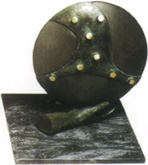
Before long, there will be a new exhibition of Maria João Oliveira and of 11 other Portuguese ceramists, among them, Júlio Resende in the Gallery of Exhibitions of Leal Senado•
António Conceição Júnior
"THE CERAMICS AND THE SKILL" OF MARIA JOÃO DE OLIVEIRA
Who moulded this silent and forsaken hand
To a cracked goblet, forced from a deep slumber
Calm, green, subtle from abysmal sea;
This dying hand of beauty
By submerging and raising from the depth
The goblet intoxicated by tears and wine?
Who moulded this wrinkled hand
Tearing, chopping like a sword
Upon the shroud of emotion,
Displaying a cold and nude body
Like an empty sepulchre
Whence the heart flew interest?
Who moulded this hand virile and restive of martial shield, a booty severe and strong
Fashioned like the bronze of heroes?
All of them earthern wares like the flesh and wish
Who has moulded, like a moulding kiss And later cruelly restrained•
António Manuel Couto Viana
Editorial activities of ICM
In this section of the News the Editorial Board is praised for its dynamism and for its work that doesn't usually draw much public attention as other sectors of the Institute. Yet, within its relative obscurity substantial things are taking shape and, as material proof, there is a list of twenty titles already at the editorial stage, ready for publication by the Editorial Sector, which constitutes one of the basic supports of continuity of the portuguese presence in Macau and the luso-chinese interchange. Adequately bilingual, many of the forthcoming editions [more than twenty publications are expected to be printed before the end of the year] will undoubtedly contribute to the understanding of Portuguese culture inside mainland China.
During the past three months nine titles were made public in an editorial out-flow. "Letters from a Commander in the Far East" by Vice-Admiral Raposa de Matos and "Portuguese Warships in the Typhoons on the Chinese Sea" [by the same author] are log books of a scientifically-oriented memorialist, relating his vivid experiences while on commission in Macau and Timor on the sloop "Gonçalo Zarco". The first title required the assistance of the Marine Services and the second combined the editorial collaboraton of the two said participants with the Meteorological Services.
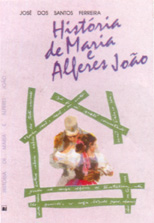
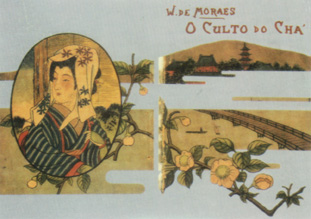
This quarterly notebook announces furthermore the publication of "the Cult of Tea" by Wenceslau de Morals printed with scrupulous facsimile and in beautiful colours as to guarantee this one to be a best seller on the market. All this is assumed to promote portuguese literature in the spheres of chinese and english reading. Likewise," Letters from Japan" will be in print in the respective languages.
Now the "Mission" by Ferreira de Castro, is again edited in Chinese, owing to its popularity with the readers and literary of China.
On the 120th commemorative anniversary of the founder of modern China, the ICM issued a beautiful edition [Portraits of a lifetime] in remembrance of the life of Dr. Sun Yat Sen, the historical figure who very often stayed in Macau. It is a book-cum-album with the reproduction of 60 allusive paintings by the painter Shen Yao Yi, a graduate of the School of Fine Arts of Peking and legended by his wife, Zhao Wei. It is a trilingual edition [Portuguese, Chinese and English].
"História de Maria e Alferes João" is a portuguese version of the novel by José dos Santos Ferreira, originally written in "dóci papiaçám di Macau antigo"-
- "Estória di Maria co Alféris Juám".
The 3rd edition of "Cheong Sam -
- A Cabaia" by Deolinda da Conceição deserves distinction as the work of an authoress of Macau, who wrote feverishly and passionately on the life of the territory It is a collection of fables written during the golden period of "Notícias de Macau', the pioneer journal which brought together some of the best brains and scholars of Macau of the 50's. It is a facsimile Edition with an evocative preface by her son António Conceição Júnior.
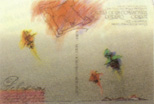
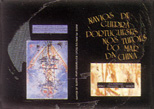
There are two more titles in the pedagogical sector "Música Popular Portuguesa" [with words and music of some of the most popular portuguese songs] and "Curso de Lingua Portuguesa [with collaboration from the Board of Education].
One of the most important publications was the re-edition of the facsimile book - "A voz o Passado"- by Jack Braga adapted from "A Collection of various events in the very noble city of Macau" a compilation by an unknown author of the various documents found in the records of Leal Senado which are very essential for the reconstitution of the historical chronology of Macau.
By the end of September a fine edition will have been printed - "Photo biography of Deolinda Salvado da Conceicao" - the said authoress of "A Cabaia" with preface and evocation by António Conceição Júnior and José dos Santos Ferreira.
With final reference to the twenty titles to be published by the end of the year, there will be a publication of the edition of the book" La Chine et les Chinois" illustrated with the famous and beautiful gravures of August Bourget•
The distribution of Macau editions in China
For the realization of a serious cultural interchange and for the mutual understanding of politics, economics, society, culture an art, the ICM and the General Import and Export Book Company of China, Canton branch, recently signed an agreement regarding the distribution of books and magazines edited by ICM, in the People's Republic of China.
The agreement was signed by the President of ICM, Jorge Morbey and his counter-part, the Manager of the Canton Branch, Zhang Shi Ming. The distribution of publications edited by the Administration of Macau in the People's Republic of China indicates a new development in the domain of cultural interchange between China and Macau...
From now on, the chinese readers can obtain copies of ICM publications in all the bookstalls of China, namely those edited in Chinese, English as well as bilingual [portuguese-chinese] editions.
It is hoped that this important and meaningful event will be practical and effective in such a satisfactory manner that it will open new and distinct ways towards the propagation of the portuguese Culture in China, while re-establishing a faded, yet reviving, tradition as to become a historical landmark of luso-chinese cultural dialogue•
2nd course in Portuguese Language and Culture
One of the remarkable activities in this quarterly term, and a fruitful propagation of the Portuguese Language and Culture in proximity with the communities of luso-descent, was the Holiday Course, held from 19th July to 14th August.
Last summer it was realized for the first time in Macau, with a registration of 30 students.
The course showed this year remarkable progress, with the estimated participation of 120 students, coming from the University of Kyoto, the University of Foreign Languages, Peking, the University of California [Santa Bárbara] and from the University of East-Asia [Macau].
The courses, basically on portuguese language were given by teachers of Secondary Schools in Macau and of the University of Foreign Languages, Peking. Besides teaching Portuguese, there were classes on portuguese regional dances, portuguese drama, portuguese movies and choral singing, and each group of student who had attended the classes gave a display of the corresponding disciplines during the solemn closing ceremony that included the presentation of diplomas in the Teatro D. Pedro V.
The registered students had the privilege to visit the historical places and cultural institutions of Macau, and their final gathering at the end of the course displayed their feelings of brotherhood in the pursuit of Cultural co-existence•
25 Years of the S. Pio X Music Academy
The recent award bythe Governor of Macau, to the S. Pio X Music Academy expresses the official recognition of its intrinsic cultural merit with respect to the services rendered to the macanese community in the field of music and singing.
We feel obliged to transcribe here, within the programme of commemorative activities a brief historical review of the Academy for a better historical insight of its existence, its activities and its achievements.
As per suggestion formerly agreed upon with the prelate of the Diocese of Macau and with the subsequent insistence of Dr. Ivo Cruz. the Director of Conservatório Nacional de Lisboa, the S. Pio X Music Academy was founded in 1962. as "Escola das Missões Católicas" with the opening of its first school year on 2nd October of the same year.
The classes had, at first, barely the minimum indispensable material and furniture. Some desks and chairs, presently in use, were offered by the Rev. Bishop D. Paulo José Tavares, who informed us that in the future the grant from the Diocese woul be limited to the concession of building. Truly, it has been so.
In 1975, for want of sufficient space, D. Arquimínio R. da Costa authorized the extension of the buildings, the costs of which were borne by the Government of Garcia Leandro. The recent improvement of the auditorium integrated with the maintenance of the Centro Católico building, we understand, was authorized by the then Vicar General, D. Domingos Lam, today Bishop Co-adjutant.
It can be rightly emphasized that this Academy would not have become a reality in 1962, had it not been for the closest collaboration of the late Fr. Céar Brianza and Prof. António Freire Garcia, Inspector General of Music Studies in the Province of Angola. The natural zeal in those bygone days of the Teachers and Students did not prevent us from understanding the poor financial situation derived exclusively from the receipt of students fees, which could not guarantee the continuity of the academy. It was decided by the then Governor Lopes dos Santos to confer on the Academy, in consideration of its usefulness to the Province as a private institution, cultural in character with a monthly grant through the Centro de Informação e Turismo.
Under the Governments of Nobre de Carvalho, Garcia Leandro and Melo Egídio, the subsdiy sanctioned in the State Budget was directly remitted to the Acdemy by Servicços de Finanças until during the Government of Almeida da Costa per order of the Deputy Secretary Dr. Jorge Rangel, the subsidy was channelled through the newly established Instituto Cultural de Macau.
The Music Academy of S. Pio X was founded with the objective to provide for the Portuguese and Chinese youngsters of Macau a gradually progressive and academic musical education. Bilingual instruction in Portuguese and Chinese was a prerequisite, to which English was added. A few students who passed from the Academy and then left for overseas, at least some three of four of them, pursued their studies in music and graduated from Higher Grade Music Schools or Universities. Several of them are found working in Canada, the United States, Formosa, Hong Kong, Australia, Rome, Vienna, Geneva and in Portugal. Setting a good example before us is Professor Simão Barreto. We have got news that six or eight of our ex-students are presently holders of the University degree of "Master of Arts".
Doubtless to say that most of these students have no intention of returning to Macau.. As for our part,, we feel we have accomplished our mission, and feel happy by our modest contribution to the cause of education and musical up-bringing of these young people who are today "Artists".
Of commemorative programmes which are associated with some of the most qualified portuguese names in the field of musical interpretation and singing we shall be presenting more detailed information in our next issue, expecting to release some reviews for the months of October and November.
But from now on RC rejoices, and congratulates the Music Academy of S. Pio X and its Rev. Father Áureo de Castro·
Three Magazines in Macau
With the remarkable exception of "Boletim Eclesiastica de Macau", which has been published since 1903, over a year ago no other Portuguese magazine but RC was printed in Macau after the closure of "Nam Van Revista".
It should be recognized that the cultural vitality now in force in the Territory has brought forth the publication of three magazines within one year's time. Three publications with different scopes and perspectives conform to the perception of editorial diffusion, analysis and study of the realities of the macanese society in general.
The first one, according to the date of issue, is the magazine "Hou Keng', the official organ of the Association of Social Sciences of Macau [ASSM] which has been attracting attention of the most interested and learned persons of the Chinese community. The magazines concerns the sociological studies of Macau during the last two years.
In its second year of existence, Hou Keng, edited in Chinese [with a summary and resumé of the articles in Portuguese] has been publishing various themes covering historical studies of a political administrative nature in the cultural and economic fields exposing a pragmatic approach in concise style with the relevant intention of contributing to the solutions of the fundamental and the current problems of the macanese society, which is visualized in the declared policy of "one country, two systems" of 1999. In this issue of RC a text by the President of ASSM is introduced.
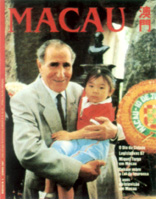
The new magazine "Macau/ Ou Mun" edited by Gabinete de Comunicação Social [GCS], managed by journalist Miguel Lemos and its executive Helder Fernando is on sound footing promising a bright future. printed on "couché" paper the magazine has 76 pages displaying a graphic representation of the written words, thus contributing to the propagation of various presentday problems and aspects of reality of the Territory, thereby attributing some sections to contributors who endear themselves in publication of this nature. We are referring here to the features in the ethographic and linguistic sphere and those on the history of Macau.
Besides this, there are several articles of substantial cultural valour and density which proves that the Administration of Macau has a correct approach with regard to the fundamental and unique strategy to promote the portuguese continuity in some parts of mainland China during the transition period.
On our part, although we have published three editions [in Portuguese, Chinese and English] useful information to those readers who value our editorial activities we are just hinting at the enforcement and perfection of our publications in the future. We hope the readers will be able to judge our efforts·
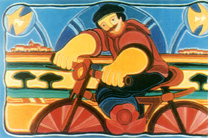
António Carmo
The exhibition "Da Realidade à Fantasia" [From reality to dream] by the Portuguese painter António Carmo was inaugurated in the "Galeria da Livraria Portuguesa de Macau'. And so, there were those typical portuguese touches of gold, the whisper of the voices of these good people, a hint of azure skies and the linger of the endless nights of its high countryside scattered around before the eyes of the macanese public, condensed in 30 oils and temperas.
start p. 104
end p.